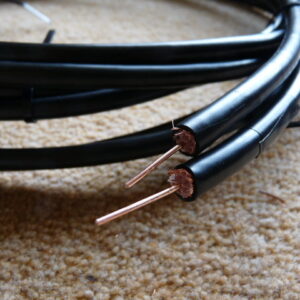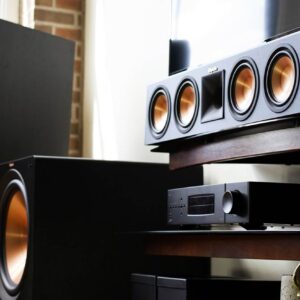If you’re looking for a way to keep your home theatre powered up and running, a home theatre power manager is a great option. They can help you save money on your energy bill and keep your equipment running smoothly. Here’s what you need to know about home theatre power managers.
What Is Home Theater
Home theater is a system that brings movie theater quality sound and picture into the home. The term “home theater” can refer to either a dedicated room in the home or to any type of audio/visual system set up to create an immersive experience in the home.
A typical home theater set-up includes a large screen television, a surround sound system, comfortable seating, and dimmable lighting. Many people also include a Blu-ray player and streaming media player in their home theater set-up.
The purpose of a home theater is to provide an immersive experience that replicates the feeling of being in a movie theater. When done right, a home theater can transport you to another place and time, making you feel like you are part of the action on the screen.
What is a home theatre power manager?
A home theater power manager is a device that helps to regulate and distribute the power to your home theater components. It can help protect your investment by keeping your equipment from overloading circuits and damaging components. A properly functioning home theater power manager can also improve the overall picture quality of your system by providing clean, uninterrupted power to your sensitive electronics.
What Does a Power Manager Do?
In the business world, a power manager is responsible for the distribution and management of electricity within a company. This includes overseeing the maintenance of equipment and ensuring that the company’s power needs are met in an efficient and cost-effective manner.
A power manager must have a strong understanding of electrical systems and be able to troubleshoot problems as they arise. They must also be able to work with other departments within the company to ensure that all power-related needs are met.
An effective power manager will have excellent communication and organizational skills. They will also be able to think critically and make decisions quickly in order to keep the company’s operations running smoothly.
Does a Power Manager Affect Audio Quality?
A power manager is a device that helps to regulate the flow of electricity in a computer. Many people believe that a power manager can help to improve the audio quality of their computer. However, there is no scientific evidence to support this claim.
There are a few potential reasons why someone might think that a power manager affects audio quality. One reason is that a power manager can help to reduce electrical interference. This interference can cause distortion in the sound waves, which can make the audio sound worse. Another reason is that a power manager can help to improve the signal-to-noise ratio. This ratio measures how much of the signal is noise, and a higher ratio means better audio quality.
Although there are some potential benefits of using a power manager, there is no guarantee that it will actually improve audio quality.
Is a home theatre power manager necessary?
A home theatre power manager is a device that helps to regulate and distribute the electricity flowing to your home cinema equipment. It is designed to protect your AV equipment from power surges and brownouts, while also extending the life of your electronics by reducing stress on the internal components.
So, is a home theatre power manager necessary? The answer depends on a few factors. If you live in an area with frequent power outages or fluctuations, then a power manager will help to keep your equipment safe. If you have expensive AV equipment that you want to last for many years, then a power manager can help to prolong its lifespan. And if you are simply looking for the best possible picture and sound quality from your home cinema setup, then a power manager can also help to improve performance.
In short, there are several good reasons to invest in a home theatre power manager.
The benefits of having a home theatre power manager
If you’re a home theatre enthusiast, you know that having a good power manager is essential to protecting your equipment. Not only does a power manager protect your equipment from power surges, but it can also help improve the quality of your sound and video. Here are some of the benefits of having a home theatre power manager:
1. Protects your equipment: A good power manager will protect your home theatre equipment from power surges and brownouts. This can save you hundreds of dollars in repairs or replacement costs.
2. Improves sound quality: A power manager can help to improve the quality of your sound by providing clean, uninterrupted power to your audio components. This can result in cleaner, clearer sound reproduction.
3. Improves video quality: Power managers can also help to improve the quality of your video by providing clean, uninterrupted power to your video components.
How to choose the right home theatre power manager
When it comes to choosing the right home theatre power manager, there are a few things to consider. First, what is your budget? Home theatre power managers can range in price from a few hundred dollars to a few thousand. Second, what is the size of your home theatre? The size of your home theatre will dictate how many watts you need to power your equipment. Third, what is your equipment list? Make sure you have a list of all the equipment you need to power and match it up with the number of watts each piece of equipment uses. Fourth, do some research! Read reviews of different home theatre power managers and see which one fits your needs the best. Fifth, make sure you have enough outlets! You don’t want to be stuck with a bunch of cords running all over your home theatre. Sixth, consult with an expert!
The top 3 home theatre power managers
As the home theater systems have become more and more powerful, the need for a good power manager has also increased. Here are the top 3 home theater power managers that you can use to keep your theatre running smoothly:
1. The Panamax M5400-PM is a great choice for those who want to be able to manage their theatre’s power without breaking the bank. It features 8 outlets, surge protection, and EMI/RFI filtering.
2. The Belkin PureAV PF60 is another excellent option for managing your home theater’s power. It features 12 outlets, surge protection, and EMI/RFI filtering.
3. The Monster Power HTPS700 is a great choice for those who want the best of the best when it comes to managing their home theater’s power.
The Difference Between a Power Conditioner and a Surge Protector
When it comes to protecting your electronic devices, you may be wondering what exactly is the difference between a power conditioner and a surge protector. Here’s a breakdown of the two so you can decide which one is right for you.
A power conditioner is a device that helps regulate the voltage coming from your outlet. This is important because too much or too little voltage can damage your electronics. A power conditioner also filters out any AC noise that could interfere with your devices.
A surge protector, on the other hand, protects your devices from sudden spikes in voltage. These spikes can happen for a variety of reasons, including lightning strikes and downed power lines. Surge protectors will keep your devices safe by absorbing the excess voltage and redirecting it to the ground.
How Much Should I Spend on a Home Theater Power Manager?
A home theater power manager is a great way to keep your electronics safe from power surges. But how much should you spend on one?
To figure out how much to spend on a home theater power manager, you’ll need to consider the number of devices you’ll be plugging into it and the level of protection you need. For example, if you have a lot of expensive electronics, you’ll want a power manager with more features and better protection.
If you’re not sure how much to spend on a home theater power manager, ask an expert at your local electronics store. They can help you choose the right model for your needs and budget.
FAQs
How long do power managers last?
When it comes to power managers, how long they last can depend on a number of factors. For instance, the quality of the power manager will play a role in how long it lasts. In addition, how often it is used will also impact its lifespan. Generally speaking, though, most power managers can last for several years with proper care.
To get the most out of your power manager, it is important to follow some key tips. First, always make sure to use high-quality batteries. Second, avoid using the power manager in extreme temperatures. Third, keep the power manager clean and free of debris. By following these simple tips, you can help ensure that your power manager has a long and fruitful lifespan. Power managers can last for a long time if they are properly maintained. However, if they are not maintained properly, they can fail prematurely.
Can you plug a power conditioner into a surge protector?
A power conditioner is a device that is designed to improve the quality of the power that is supplied to your electronic devices. A surge protector is a device that is designed to protect your electronic devices from damage caused by surges in the power supply.
Can you plug a power conditioner into a surge protector? The answer is yes, you can. However, there are some things that you need to know before you do.
First, not all surge protectors are created equal. Some surge protectors will only provide protection against very small surges, while others will provide protection against larger surges. If you are using a power conditioner with sensitive electronics, you will want to make sure that you have a surge protector that can handle the amount of current that the power conditioner will draw.
Second, most power conditioners will have a ground terminal.
Do power strips reduce power?
It’s a common question, and one that has been debated for years. The answer, unfortunately, is not a simple one.
There are many factors to consider when trying to determine if power strips reduce power. The type of power strip, the quality of the strip, how it’s being used, and even the environment can all play a role in how much power is actually being saved.
That said, there are some general tips that can help you save power when using power strips. For example, make sure to turn off all devices that are plugged into the strip when you’re not using them. And be sure to unplug thestrip from the wall outlet when it’s not in use.
By following these tips, you can help reduce your energy consumption and save money on your electricity bill.
What is the best home theater power manager to buy?
There are a lot of different home theater power managers on the market, and it can be tough to decide which one to buy. Here are a few things to keep in mind when choosing a power manager for your home theater:
First, consider how many devices you’ll need to power. If you have a lot of components, you’ll need a power manager that can handle the load.
Second, think about what features you need. Some power managers come with surge protection, while others include USB charging ports or remote control capability.
Finally, take into account your budget. Power managers can range in price from around $30 to $200 or more. Decide how much you’re willing to spend before shopping around.
How to choose Best Home Theater Power Managers
There are a lot of different home theater power managers on the market, and it can be tough to decide which one to buy. Here are a few things to keep in mind when choosing a power manager for your home theater:
First, consider how many devices you’ll need to power. If you have a lot of components, you’ll need a power manager that can handle the load.
Second, think about what features you need. Some power managers come with surge protection, while others include USB charging ports or remote control capability.
Finally, take into account your budget. Power managers can range in price from around $30 to $200 or more. Decide how much you’re willing to spend before shopping around.
Can I plug all of my studio components into a power conditioner?
Yes, you can plug all of your studio components into a power conditioner. However, there are a few things to keep in mind before doing so. First, make sure that the power conditioner is rated for the wattage of your components. Second, check to see if the conditioner has multiple outlets or just one. If it has multiple outlets, you’ll need to determine how many outlets you’ll need to use. Finally, make sure that the power conditioner is compatible with the voltage in your country.
Will a power conditioner stop the ground loop?
Most people experience a ground loop when they plug their devices into an outlet. This can cause a humming noise or even a shock. A power conditioner will not stop the ground loop, but it can help to reduce the effects.
There are a few things that you can do to help reduce the effects of a ground loop. First, make sure that all of your devices are properly grounded. Second, use a power conditioner to help regulate the flow of electricity. third, avoid using extension cords. fourth, use surge protectors to protect your devices from power surges. fifth, keep your devices clean and free of dust. Sixth, avoid using outlets that are not grounded. Seventh, have an electrician check your wiring if you suspect that it is causing the problem.
Can you daisy-chain power conditioners?
Yes, you can daisy-chain power conditioners. This is a common practice when you need to condition multiple outlets or when you have multiple pieces of equipment that need conditioning. When daisy-chaining power conditioners, you’ll want to make sure that the total amperage draw of all the devices does not exceed the amperage rating of the first power conditioner in the chain. Additionally, you’ll want to make sure that all the devices are plugged into outlets that are on the same circuit.
Is UPS the same thing as a power conditioner?
There are a lot of misconceptions when it comes to UPS systems and power conditioners. A UPS system is not the same thing as a power conditioner, although they are both used to improve the quality of your power. Here’s a look at the differences between these two devices.
A UPS system is designed to provide emergency power in the event of a power outage. It does this by using batteries to keep the equipment running until the power can be restored. A power conditioner, on the other hand, is designed to improve the quality of your power. It does this by filtering out noise and regulating voltage fluctuations.
So, which one do you need? If you’re looking for emergency backup power, then you need a UPS system. If you’re just looking to improve the quality of your power, then you need a power conditioner.
Conclusion
In conclusion, a home theatre power manager is a device that helps to regulate the flow of electricity to your home theatre system. It is important to choose a power manager that is compatible with your system and that offers the features that you need. A power manager can affect the audio quality of your home theatre system, so it is important to select one that will provide the best possible sound quality for your system.









